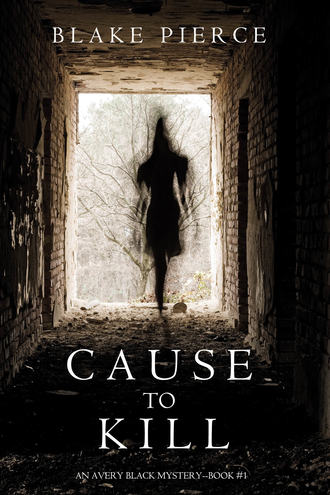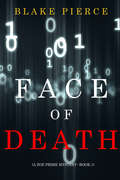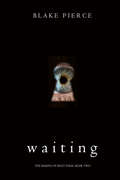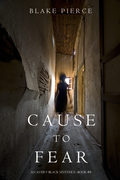
Блейк Пирс
Cause to Kill
CHAPTER THREE
The park had already been closed off to the public.
Two plainclothes officers flagged down Ramirez’s car and quickly waved them away from the main parking lot and over to the left. Among the officers that were obviously from her department, Avery spotted a number of state police.
“Why are the troopers here?” she asked.
“Their home base is right up the street.”
Ramirez pulled over and parked next to a line of police cruisers. Yellow tape had sectioned off a large area of the lot. News vans, reporters, cameras, and a bunch of other runners and park regulars stood by the tape to try to see what was happening.
“Nobody beyond this point,” an officer said.
Avery flashed a badge.
“Homicide,” she said. It was the first time she’d actually acknowledged her new position, and it filled her with pride.
“Where’s Connelly?” Ramirez asked.
An officer pointed toward the trees.
They made their way across the grass, a baseball diamond on their left. More yellow tape met them before a line of trees. Under thick foliage was a walking path that wound its way along the Charles River. A single officer, along with a forensics specialist and a photographer, stood before a bench.
Avery avoided initial contact with those already on the scene. Over the years, she’d come to find that social interactions strained her focus, and too many questions and formalities with others sullied her point of view. Sadly, it was yet another characteristic of hers that had incurred the scorn of her entire department.
The victim was a young girl placed askew on the bench. She was obviously dead, but with the exception of her bluish skin tone, her position and facial expression might have made the average passerby think twice before they wondered if something was wrong.
Like a lover waiting for her paramour, the girl’s hands were placed on the bench-back. Her chin rested on her hands. A mischievous smile curled on her lips. Her body was turned, as if she’d been in a sitting position and had moved to look for someone or breathe out a heavy sigh. She was clothed in a yellow summer dress and white flip-flops, lovely auburn hair flowing over her left shoulder. Her legs were crossed and her toes rested gently on the path.
Only the victim’s eyes gave away her torment. They emanated the pain and disbelief.
Avery heard a voice in her mind, the voice of the old man that haunted her nights and daydreams. In regards to his own victims, he had once asked her: What are they? Only vessels, nameless, faceless vessels – so few among billions – waiting to find their purpose.
Anger rose up in her, anger born at being exposed and humiliated and most of all, from having her entire life shattered.
She moved closer to the body.
As an attorney, she’d been forced to examine endless forensics reports and coroner’s photos and anything else related to her case. Her education had vastly improved as a cop, when she routinely analyzed murder victims in person, and could make more honest assessments.
The dress, she noticed, had been washed, and the victim’s hair cleaned. The nails and toenails were freshly polished, and when she took a deep whiff of skin, she smelled coconut and honey and only the faint hint of formaldehyde.
“You gonna kiss it or what?” someone said.
Avery was bent over the victim’s body, hands behind her back. On the bench was a yellow placard labeled “4.” Beside it, on the girl’s lower waist, was a stiff orange hair, barely perceptible among the yellow of her dress.
Homicide Supervisor Dylan Connelly stood akimbo and waited for an answer. He was tough and rugged, with wavy blond hair and penetrating blue eyes. His chest and arms nearly tore out of his blue shirt. His pants were brown linen, and thick black boots adorned his feet. Avery had noticed him often in the office; he wasn’t exactly her type, but he had an animal ferocity about him that she admired.
“This is a crime scene, Black. Next time, watch where you’re walking. You’re lucky we already dusted for prints and shoes.”
She looked down, baffled; she had been careful where she had walked. She looked up at Connelly’s steely eyes and realized he was just looking for a reason to ride her.
“I didn’t know it was a crime scene,” she said. “Thanks for filling me in.”
Ramirez snickered.
Connelly bit down and stepped forward.
“You know why people can’t stand you, Black? It’s not just that you’re an outsider, it’s that when you were on the outside, you had no real respect for cops, and now that you’re on the inside, you have even less respect. Let me be perfectly clear: I don’t like you, I don’t trust you, and I sure as hell didn’t want you on my team.”
He turned to Ramirez.
“Fill her in on what we know. I’m going home to take a shower. I feel sick,” he said. Gloves were removed and thrown to the ground. To Avery, he added: “I expect a full report by the end of the day. Five o’clock sharp. Conference room. You hear me? Don’t be late. And make sure you clean this mess up, too, before you leave. State troopers were kind enough to step aside and let us work. You be kind enough and show them some courtesy.”
Connelly walked away in a huff.
“You have a real way with people,” Ramirez admired.
Avery shrugged.
The forensics specialist on the scene was a shapely young African American named Randy Johnson. She had large eyes and an easy way about herself. Short, dreadlocked hair was only partially hidden behind a white cap.
Avery had worked with her before. They’d formed a fast bond during a domestic violence case. The last time they’d seen each other was over drinks.
Excited to be on another case with Avery, Randy held out a hand, noticed her own glove, blushed, guffawed, and said, “Oops,” followed by a wacky, eek! expression and the proclamation: “I might be contaminated.”
“Good to see you too, Randy.”
“Congrats on Homicide.” Randy bowed. “Moving up in the world.”
“One wacko at a time. What have we got?”
“I’d say someone was in love,” Randy replied. “Cleaned her up pretty good. Opened her up from the back. Drained her body, filled her up so she wouldn’t rot, and stitched her up again. Fresh clothes. Manicure. Careful too. No prints yet. Not much to go on until I get to the lab. Only two wounds I can find. See the mouth? You can either pin this from the inside, or use gel to get a corpse to smile like that. From the puncture wound here,” she pointed at the corner of a lip, “I’d guess injection. There’s another one here,” she noted on the neck. “By the coloring, this came earlier, maybe at the time of abduction. Body has been dead for about forty-eight hours. Found a couple of interesting hairs.”
“How long has she been here?”
“Bikers found her at six,” Ramirez said. “The park is patrolled every night around midnight and three a.m. They didn’t see anything.”
Avery couldn’t stop staring at the dead girl’s eyes. They seemed to be looking at something in the distance, yet close to the shoreline, on their side of the river. She carefully maneuvered to the back of the bench and tried to follow the line of sight. Downriver, there were a bunch of low brick buildings; one of them was short; a white dome rested on its on top.
“What building is that?” she asked. “The large one with the dome?”
Ramirez squinted.
“Maybe the Omni Theatre?”
“Can we find out what’s playing?”
“Why?”
“I don’t know, just a hunch.”
Avery stood up.
“Do we know who she is?”
“Yeah,” Ramirez replied and checked his notes. “We think her name is Cindy Jenkins. Harvard senior. Sorority sister. Kappa Kappa Gamma. Went missing two nights ago. Campus police and Cambridge cops put her picture up last night. Connelly had his people check through photos. Hers was a match. We still need confirmation. I’ll call the family.”
“How are we on surveillance?”
“Jones and Thompson are on that now. You know them, right? Great detectives. They’re assigned to us for the day. After that, we’re on our own unless we can prove we need the extra resources. No entrance cameras to the park, but there are some up the highway and across the street. We should know something this afternoon.”
“Any witnesses?”
“None so far. The bikers are clean. I can troll around.”
Avery surveyed the surrounding area. Yellow tape encompassed a large swath of the park. Nothing out of the ordinary could be found near the river or on the bike path or grass. She tried to form a mental picture of events. He would have driven in through the main road, parked his car close to the water for easy access to the bench. How did he get the body to the bench without causing suspicion?
She wondered. People might have been watching. He had to prepare for that. Maybe he made it look like she was alive? Avery turned back to the body. It was a definite possibility. The girl was beautiful, even in death, ethereal almost. He had obviously spent a lot of time and planning to ensure she looked perfect. Not a gang kill, she realized. Not a scorned lover. This was different. Avery had seen it before.
Suddenly, she wondered if O’Malley was right. Maybe she wasn’t ready.
“Can I borrow your car?” she asked.
Ramirez cocked a brow.
“What about the crime scene?”
She offered a confident shrug.
“You’re a big boy. Figure it out.”
“Where are you going?”
“Harvard.”
CHAPTER FOUR
He sat in an office cubicle – superior, victorious, more powerful than anyone on the planet. A computer screen was open before him. With a deep breath, he closed his eyes, and remembered.
He recalled the cavernous basement of his home, more like a garden nursery. Multiple varieties of poppy flowers lined the main room: red, yellow, and white. Many other psychedelic plants – each one accrued over countless years – had been placed in long troughs; some were alien-like weeds or intriguing flowers; many had a more common appearance that would have been overlooked in any wildlife setting, despite their potent abilities. A timed watering system, temperature gauge, and LED lights kept them thriving.
A long hallway made of wooden beams led to other rooms. On the walls were pictures. Most of the pictures were of animals in various stages of death, and then “rebirth” as they were stuffed and positioned: a tabby cat on its hind legs playing with yarn; a white and black spotted dog, rolled over and waiting for a tummy rub.
Doors came next. He imagined the door on the left opened. There, he saw her again, her naked body laid out on a silver table. Strong fluorescent lighting lit the space. In a glass case were many colorful liquids in clear jars.
He’d felt her skin when he’d rubbed his fingers along the outside of her thigh. Mentally, he reenacted each delicate procedure: her body drained, preserved, cleaned, and stuffed. Throughout the rebirth, he took photos that would later cover more walls saved for his human trophies. Some of the photos had already been placed.
Tremendous, surreal energy flowed through him.
For years, he had avoided humans. They were scary, more violent and uncontrollable than animals. He loved animals. Humans, however, he discovered to be more potent sacrifices for the All Spirit. After the girl’s death, he’d seen the sky open, and the shadowy image of the Great Creator had looked at him and said: More.
His reverie was broken by a snapping voice.
“You daydreaming again?”
A grumbling worker stood overhead with a scowl on his face. He had the face and body of a former football player. A sharp blue suit did little to diminish his ferocity.
Meekly, he lowered his head. His shoulders slightly hunched, and he transformed into a forgettable, diminutive worker.
“I’m sorry, Mr. Peet.”
“I’m tired of the apologies. Get me those figures.”
Inwardly, the killer smiled like a laughing giant. At work, the game was almost as exciting as his private life. No one knew how special he was, how dedicated and essential to the delicate balance of the universe. None of them would receive an honored place in the realm of the Overworld. Their everyday, mundane, earthly tasks: dressing up, having meetings, pushing money around from place to place – were meaningless; it was only meaningful to him because it connected him to the outside world and allowed him to do the Lord’s work.
His boss grumbled and walked away.
Eyes still closed, the killer imagined his Overlord: the shadowy, dark figure that whispered in his dreams and directed his thoughts.
A song of homage formed on his lips, and he sang in a whisper: “Oh Lord, oh Lord, our work is pure. Ask and I give you: More.”
More.
CHAPTER FIVE
Avery had a name: Cindy Jenkins. She knew the sorority: Kappa Kappa Gamma. And she was fully aware of Harvard University. The ivy league school had rejected her as an incoming freshman, but she’d still found a way to soak in Harvard life throughout her own college career, as she’d dated two boys from the school.
Unlike other colleges, the sororities and fraternities of Harvard weren’t officially acknowledged. No Greek houses existed on or off campus. Partying, however, happened regularly at multiple off-campus houses or apartment complexes under the name of “organizations” or specialized “clubs.” Avery had witnessed firsthand the paradox of college life during her own college tenure. Everyone pretended to be solely focused on grades until the sun went down and they transformed into a bunch of wild, partying animals.
At a red light, Avery performed a quick Internet search to discover that Kappa Kappa Gamma rented two areas on the same block in Cambridge: Church Street. One of the locations was for events, the other for meetings and socializing.
She drove over Longfellow Bridge, past MIT, and hung a right onto Massachusetts Avenue. Harvard Yard appeared on her right with its magnificent red brick buildings set among a forest of trees and paved pathways.
A parking spot opened on Church Street.
Avery parked, locked the car door, and lifted her face to the sun. It was a warm day, with temperatures in the high seventies. She checked the time: ten thirty.
The Kappa building was a long, two-story structure with a brick facade. The first floor housed a number of clothing shops. The second floor, Avery guessed, was reserved for office space and sorority operations. The only designation next to the second-floor buzzer was the blue fleur-de-lis symbol of Harvard; she pressed it.
A scratchy female voice came on the intercom system.
“Yeah?”
“Police,” she growled, “open up.”
Silence for a moment.
“Seriously,” the voice replied, “who is this?”
“It’s the police,” she said in earnest. “Everything is fine. No one is in trouble. I just need to speak with someone in Kappa Kappa Gamma.”
The door buzzed open.
At the top of the steps, Avery was greeted by a sleepy, haggard girl in an oversized gray sweatshirt and white sweatpants. Dark-haired, she appeared hard-partying. Wisps of hair hid most of her face. There were dark circles under her eyes, and the body that she normally took so much pride in accentuating appeared thick and formless.
“What do you want?” she asked.
“Calm down,” Avery offered. “This has nothing to do with sorority activities. I’m just here to ask a few questions.”
“Can I see some identification?”
Avery flashed her badge.
She sized up Avery, inspected the badge, and stood back.
The space for Kappa Kappa Gamma was large and bright. The ceiling was high. A number of comfortable tan couches and blue bean bags littered the area. Walls had been painted dark blue. There was a bar, a sound system, and a huge, flat-screen TV. The windows were nearly floor to ceiling. Across the street, Avery could see the top of another short apartment complex, and then the sky. A few clouds rolled by.
She guessed her college experience was a lot different from that of most of the girls in Kappa Kappa Gamma. For one, she had paid for school herself. Every day after classes she went to a local law firm and worked her way up from a secretary to an honored paralegal. She also rarely drank in school. Her father had been a raging alcoholic. Most college nights, she was either the designated driver or in the dorm studying.
A burst of hope flashed on the girl’s face.
“Is this about Cindy?” she asked.
“Is Cindy a friend of yours?”
“Yeah, my best friend,” she said. “Please, tell me she’s all right?”
“What’s your name?”
“Rachel Strauss.”
“Are you the one that called the police?”
“That’s right. Cindy left our party pretty drunk on Saturday night. No one has seen her since. That’s not like her.” She rolled her eyes and offered a slight smile when she added, “She’s usually very predictable. She’s just like, Ms. Perfect, you know? Always to bed at the same time, same schedule that never changes – needs like, five years’ notice for any changes. Saturday she was crazy. Drinking. Dancing. Threw the clock away for a while. It was nice to see.”
A distant gaze took Rachel for a moment.
“She was just, really happy, you know?”
“Any particular reason?” Avery wondered.
“I don’t know, top of her class. Has a job lined up for the fall.”
“What job?”
“Devante? They’re like, the best firm in Boston. She was an accounting major. So boring, I know, but she was a genius when it came to numbers.”
“Can you tell me about Saturday night?”
Tears came to Rachel’s eyes.
“This is about Cindy, isn’t it?”
“Yeah,” Avery said. “Maybe we can sit down?”
Rachel crashed on the couch and cried.
Through sobs, she tried to speak.
“Is she all right? Where is she?”
It was the part of the job Avery hated the most – talking to relatives and friends. There was only so much she was allowed to discuss. The more people learned about a case, the more they talked, and that talk had a way of getting back to the perpetrators of crimes. No one ever understood that or cared in the moment: they were too distressed. All they wanted were answers.
Avery sat beside her.
“We’re really glad you called,” she said. “You did the right thing. I’m afraid I can’t talk about an ongoing investigation. What I can tell you is that I’m doing everything in my power to find out what happened to Cindy that night. I can’t do it alone, I need your help.”
Rachel nodded and wiped her eyes.
“I can help,” she said, “I can help.”
“I’d like to know everything you remember about that night, and Cindy. Who was she talking to? Was there anything that stood out in your mind? Comments she made? People that took an interest in her? Anything about when she left?”
Rachel broke down completely.
Eventually, she raised a hand and nodded and pulled herself together.
“Yeah,” she said, “sure.”
“Where is everyone else?” Avery asked as a distraction. “I thought sorority houses were supposed to be packed with hungover girls in Kappa gear.”
“They’re at class,” Rachel said and wiped her eyes. “A couple of girls went out to get breakfast. By the way,” she added, “we’re not technically a sorority house. This is just a place we rent to crash when we don’t want to go back to our dorm. Cindy never stayed here. Too modern for her. She has more of a ‘homey’ air.”
“Where does she live?”
“Student housing not far from here,” Rachel said. “But she wasn’t headed home on Saturday night. She was supposed to meet up with her boyfriend.”
Avery’s senses heightened.
“Boyfriend?”
Rachel nodded.
“Winston Graves, big-time senior, rower, asshole. None of us ever understood why she dated him. Well, I guess I did. He’s handsome and comes from tons of money. Cindy never had any money. I think, when you don’t come from money, it’s really appealing.”
Yeah, Avery thought, I know. She remembered how the money and prestige and power of her previous law firm job had made her believe she was somehow different from that scared and determined young girl who had left Ohio.
“Where does Winston live?” she asked.
“In Winthrop Square. It’s really close to here. But Cindy never made it. Winston came over early on Sunday morning looking for her. He assumed she’d just forgotten about their plans and passed out. So we went to her house together. She wasn’t there, either. That’s when I called the police.”
“Would she have gone anywhere else?”
“No way,” Rachel said. “That’s not like Cindy at all.”
“So when she left here, you’re sure she was headed over to Winston’s house.”
“Absolutely.”
“Was there anything that might have changed those plans? Anything that happened to her early in the evening, or even at the end?”
Rachel shook her head.
“No, well,” she realized, “there was something. I’m sure it’s nothing, but there’s this boy that’s had a crush on Cindy for years. His name is George Fine. He’s handsome, tough-looking, a loner, but a little weird, if you know what I mean? Works out and jogs around campus a lot. I had a class with him once last year. One of our jokes was that he’s been in a class with Cindy nearly every semester since freshman year. He’s been obsessed with her. He was here Saturday, and the crazy thing is, Cindy was dancing with him, and they even kissed. Totally not like Cindy. I mean, she’s dating Winston – not that they have the perfect relationship – but she was really drunk, and raging. They kissed, danced, and then she left.”
“Did George follow her out?”
“I don’t know,” she said. “Honestly. I don’t remember seeing him after Cindy left, but that might be because I was totally wasted.”
“Do you remember what time she left?”
“Yeah,” she said, “at exactly two forty-five. Saturday was our annual April Fool’s Night party, and we’re supposed to play this great joke, but everyone was having so much fun we forgot about it until Cindy left.”
Rachel lowered her head. Emptiness filled the air for a while.
“Well look,” Avery said, “this has been really helpful. Thank you. Here’s my card. If you can remember anything else, or if your sorority sisters have something to add, I’d love to hear about it. This is an open investigation, so even the smallest detail might give us a lead.”
Rachel faced her then with tears in her eyes. And as the tears began to roll down her cheeks, her voice remained calm and steady.
“She’s dead,” she said, “isn’t she?”
“Rachel, I can’t.”
Rachel nodded, and then she cupped her face in her hands and completely broke down. Avery leaned over and hugged her tight.







